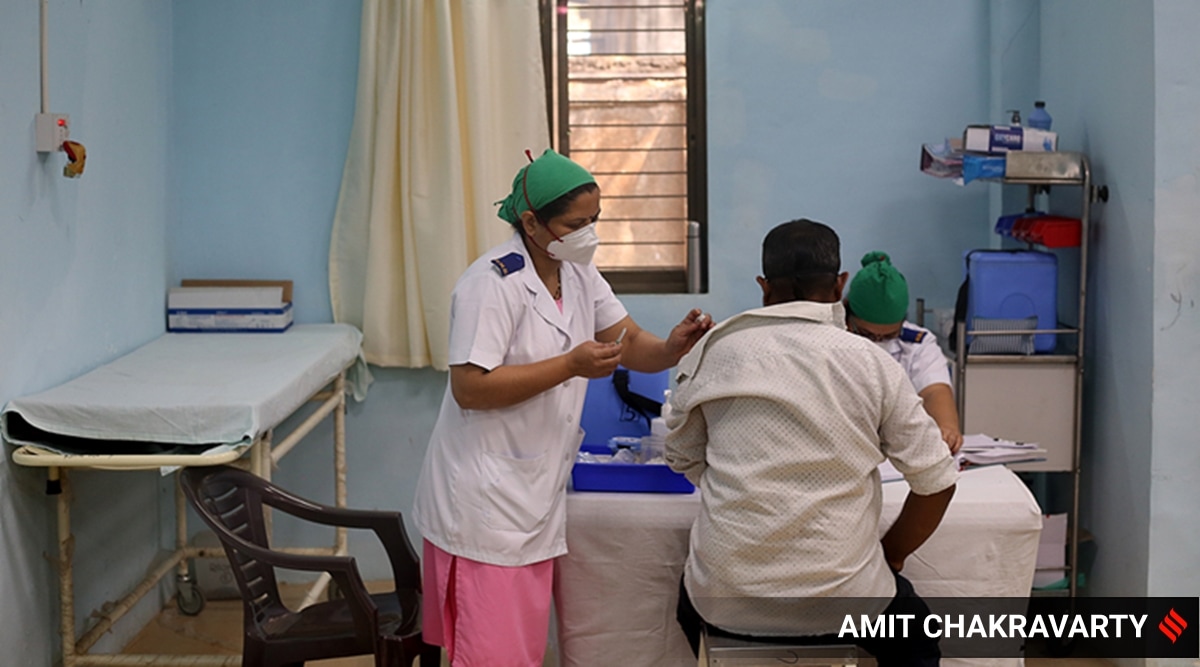 During a vaccination drive at a hospital in Ghatkopar, Mumbai. (Express Photo)
During a vaccination drive at a hospital in Ghatkopar, Mumbai. (Express Photo) The Maharashtra government has asked the central government if private charitable hospitals can be selected as vaccination centres to increase coverage and accessibility to the general public, especially in cities such as Mumbai, Pune and Thane.
From March 1, those aged above 60 years and people aged 45-60 years with comorbidities will join the pool of healthcare workers and frontline workers in immunisation. This age group is estimated to account for a population of about one crore in the state.
On Friday, the Union Health Ministry informed all states that apart from government hospitals, private hospitals empanelled with the Pradhan Mantri Jan Arogya Yojana (PMJAY) will be allowed to run vaccination centres. In Maharashtra, close to 1,000 hospitals empanelled with the Mahatma Jyotiba Phule Jan Arogya Yojana (MJPJAY) will also be allowed to carry out vaccinations.
In Mumbai, there are fewer than 50 public and private hospitals empanelled with MJPJAY. State officials said they need to rope in private hospitals to increase coverage. “The concern that the government has is that there may be difficulties in monitoring vaccination in the private sector. But in south Mumbai, we hardly have private hospitals empanelled with MJPJAY. We need more hospitals,” said a state official.
The Centre is yet to decide whether all private hospitals will be permitted to start vaccinations. The National Health Mission on Saturday informed that private hospitals can charge up to Rs 100 as user fee per dose from recipients. Hospitals will have to pay the government for vaccine doses and can charge a recipient upto Rs 150 per dose. The ceiling price of Rs 250 cannot be exceeded by hospitals. The cost will include private hospital’s investment in vaccines, cold storage, syringes, training of staff and adverse event management.
On Friday night, the government also launched the CoWIN 2.0 app, an upgraded version of the vaccination app, to allow the general public to register themselves and schedule vaccine appointments. From March first week, people will be able to register and schedule a vaccine appointment in nearby listed hospitals.
“We will begin training health workers to use the new app from Sunday. This will include both private and government centres,” said a state official.
States have until March 3 to complete training, after which they have to publish a list of registered vaccine centres by March 4, to allow the public to start scheduling appointments.
The government has listed 20 comorbidities for people in the age bracket of 45-60 years to be eligible to receive vaccination. This includes not just hypertension and diabetes but also people with heart failure in last one year, cardiac transplant, severe heart disease, cancer, end stage kidney disease, decomposed cirrhosis, sickle cell, thalassemia, HIV, and people with disabilities like muscular dystrophy, multiple disabilities including deafness, blindness, acid attack victim with respiratory involvement, and myeloma.